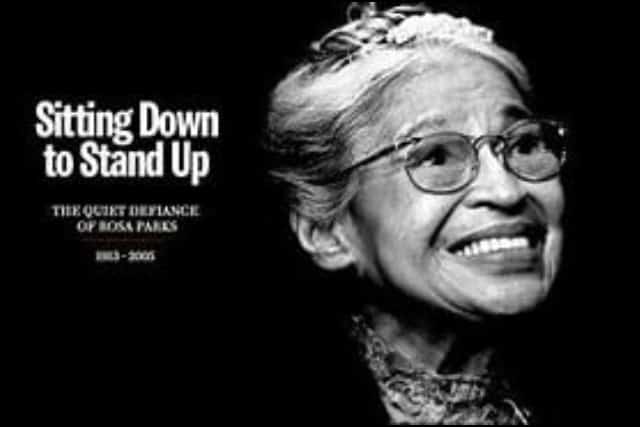As children, we were taught to never tell a lie. We have heard that if you start out telling a lie, it makes telling the truth a whole lot harder. If you lie for almost four years, it makes it even harder.
In today’s world, we find ourselves searching for those who speak the truth and for true heroes. Yes, heroes who are admired for their courage, outstanding achievements, and self-sacrificing qualities.
Let us look back at a true hero of civil rights and equality. Rosa Parks was born in Alabama in 1913. Both of her grandparents were former slaves. In her childhood, she recalled frequent sightings of Ku Klux Klan members in full garb marching down their streets. She was taught to read by her mother and attended a segregated, one-room schoolhouse. She walked to school because whites were provided transportation and desks and blacks were not. This was not unusual in the south. As an adult, after caring for her sick mother and grandmother, Rosa took a job in a shirt factory and later met her husband and married in 1932. She earned her high school degree in 1933 and joined and started working with the NAACP in 1943.
In Montgomery, Alabama where Parks lived and worked, the buses in the 1950’s had designated seating areas for whites and blacks. There were signs to divide the seating into two sections. The white area was in the front half of the bus and black seats were in the rear. When black passengers boarded the bus, they had to pay at the front and then get off the bus and re-board the bus in the back. At that time, 75% of the people who rode the buses in Montgomery were blacks.
It had apparently become the custom of Montgomery bus drivers to move the sign separating whites from blacks and ask blacks to give up their seats when there were more whites. If they refused, the bus drivers had the authority to refuse service and could call the police to have them removed.
In March of 1955, Claudette Colvin, 15, refused to give up her seat and was dragged off the bus. She was charged with violating the city bus segregation law and was convicted of assaulting a police officer. Aurelia Browder, 36, and Mary Louise Smith, 18, also had refused to give up their seats previously during that year. All three inspired Rosa Parks in her role as an activist. On December 1, 1955, the bus became crowded and some whites had to stand in the aisle. Because this occurred, the driver stopped the bus and moved the white sign back to provide more seats for the whites. As he did, he told the four black passengers sitting in the black seating area, now white, to give up their seats. On that day, three of the four black passengers complied with the bus driver’s directive to move to the rear of the bus. A brave Rosa Parks took a stand and declined to give up her seat. The police were summoned and she was then arrested for not following the bus driver’s instructions. When asked why she would not stand up, she replied, “I don’t think I should have to stand up.” That statement was so simple and so true. Many blacks endured days of standing on their feet for hours working in factories or as domestics. The police arrested her and charged her with a violation of the law. She was taken to jail and later released on bail that night.
Some have marked this event as the beginning of the civil rights movement in this country. When Parks arrived at the courthouse on December 5th, she was met by 500 local supporters. Despite that, Parks was found guilty of violating the local ordinance and was fined $14.00. Following that day, blacks boycotted buses and carpooled, took cabs, or walked to work. This boycott continued for several months. As a result, segregationists burned black churches and destroyed black families’ homes as they retaliated with violence. Blacks, not whites, were arrested on various cooked up charges. Despite the wrongful arrests, the bus boycott became one of the largest and most successful movements against racial segregation in history. Many years later, in 1996, President Bill Clinton awarded Rosa Parks the Presidential Medal of Freedom and, in 2005, she died quietly in Detroit at the age of 92. Her work was completed and she left the rest for us to carry on.
Now it’s 2020, 45 years later, each of us are faced with deciding what single or simple act we can do to help alleviate the pain of those oppressed and tired who are seeking justice. We ask, what can we do to advance the cause of this movement and where do we go from here? As we look for answers, we ask what a brave Rosa Parks would have done. Many in this country, young and old, are taking a stand at peaceful protests and, in some cases, risking their lives and health to bring their messages to DC and beyond. We would like to support them and join them in any way we find possible. We found a simple way of doing this by supporting and buying from those stores and companies that show obvious support for the equality and social justice movements. Some are putting their support in writing. We have received many emails from companies that are making statements actively opposing and combating discrimination and segregation.
As Rosa Parks on a December day refused to give up her seat, we wonder if she had any idea of the impact of this gesture and that it would start a movement that is still persevering today. It was an historic moment when a brave young lady took a “small” stand and started something very big. In our hearts, she is still alive today and her efforts continue as this country reaches a huge turning point. Today, we are faced with a critical choice of deciding whether to follow a dictatorship type government or work towards restoring our Constitution.
From the 1940’s to now, the civil rights movement has strived to keep its momentum. The search for equality for all has been and continues to be a long one. The question remains, since we have the laws in place to guard against discrimination, why are crimes against personal freedoms still occurring? The civil rights and equal rights movements have now resurfaced but will they be sustained and, as a country, will we do the right thing to make them succeed? If not, we might as well change our name from the United States to the Divided States of America.
Let us work to support the truths of this nation and ask what Rosa Parks would have done at this time in history. At minimum, she would have encouraged us to:
- Listen to the truth
- Speak the truth
- Tell no lies
- Listen to no lies
- Call out the lies
- Support reform where needed and
- Remember…136 days to the election
Be a Hero…vote by mail, vote by foot, vote by car, vote by boat…just vote!
This blog is dedicated to Andrea’s Aunt, Janet Berry (February, 1931 – June, 2020) and all those brave women who taught us to speak the truth. Andrea’s Aunt was a strong woman who supported equality and social justice and always gave back to those less fortunate. We have lost a fun and loving person in our life. She was our Hero.




I think you picked a good hero and someone many of us still know so little about. Thanks.
Thanks for your comments again because they do help us as we write our blogs. It is important to find out about and acknowledge the work of true heroes in our country and around the world. They give us hope that, if we all work together, we can achieve peace and social justice for all people. Rosa Parks and those before her put their lives on the line to make a difference and change the lives of many people.